Modi's BJP has promised more revdis or freebies for these assembly elections than ever before, points out N Sathiya Moorthy.

For those who really thought that Narendra D Modi was serious about it when he occasionally came down on what he dubbed as 'revdi culture' in Opposition-ruled states, here is something.
In the five-state assembly elections that are seen as a precursor to next year's Lok Sabha polls, Modi's BJP has promised more revdis or freebies than the rest of them.
Or, at least, the BJP has promised 'welfare schemes' that Modi otherwise has qualified as revdis.
For the uninitiated, revdi refers to sesame balls made with jaggery. In colloquial terms, it means pulling wool over the eyes, here of the voters.
There are near-similar terms inmost other Indian languages. In Tamil, the contemporary phrase is 'halva kodukkaradhu', meaning 'giving halwa', another Indian sweetmeat, or fooling or cheating or whatever.
That the term freebies is often associated with national-level politico-economic or public finance discourse on successive government hand-outs in Tamil Nadu, the comparison at this point may sound apt, but not necessarily true.
After the decades-old free noon meal scheme for school children in the south Indian state, DMK Chief Minister M K Stalin introduced free breakfast in government-run schools last year and later extended it to aided schools, as well.
It was aimed at making it easy for working women from poor economic background, whether they were engaged in farm labour or as store-assistants and the like.
The timing was just right, as after the Covid lock-down, state schools, like that elsewhere in the country, witnessed lower attendance and more so, new enrolment.
If Stalin's 'Illam Thedi Kalvi', or 'Home Education' , where volunteer-teachers conducted evening classes to make up for the knowledge-gap caused by the lockdown, the breakfast scheme has helped in better attendance in higher classes and enrolment at the entry-levels, at the elementary, high school and higher secondary (Plus-Two) levels.
What then about Tamil Nadu's free busride for all women, which replaced the erstwhile Jayalalithaa government's free two-wheelers that benefited only young women who had learnt riding them?
What about the monthly cash hand-out of Rs 1,000, for all women above 18, that goes only into the family kitty?
Already other governments are aping these schemes as much as they had implemented one or the other of earlier welfare schemes of the 'Dravidian model', or other parties have begun promising them to their voters.

While these schemes and other existing and new ones have been commended upon by international academics and institutions like the World Bank, Modi alone was hitting at the larger cause of 'social welfare schemes' aimed at uplifting the poor and downtrodden as revdi. It was a political statement, made from a possible rightist ideological orientation.
One cannot complain, either, as each individual, party and government can promote and propagate political and economic ideologies of their own. But what mattered here were Modi's periodic attacks on what he (alone) dubbed as 'revdi culture'. Interestingly, none of his Cabinet colleagues, nor any of his BJP chief ministers seem to share Modi's vision and mission in the matter.
Come five-state assembly elections, and the BJP was as enthusiastic as promising multiple welfare schemes for the voters. This is particularly so in Chhattisgarh, Madhya Pradesh and Rajasthan.
In all three states, the BJP and the Congress are pitted against each other, with no serious third contender.
In the first two, the BJP hopes to replace the 'corrupt and inefficient' Congress and in Madhya Pradesh, it expects to retain power.
A victory in all three states is said to be a sine qua non for the BJP's ability to retain power at the Centre, though there may be other factors, like the INDIA alliance for the Lok Sabha polls.
Political analysts claim that it is tough going for both parties in these three states. It is another matter that the Congress has a stake in the other two states, too, namely, Mizoram in the North-East and Telangana in the South, where the BJP has little or no presence, leave alone dominance.
The election could not have come for a better time for the Congress, so to say.
Overnight, there is at least a faint acknowledgement that the party is not a write-off, as the BJP leadership, especially Modi had made it out to be.
The fact, of course, is that the Congress still does not have even ten per cent of the total membership of the Lok Sabha, standing at 542.
Worse still, none of the three members of the party's First Family has what could be dubbed 'safe seats', unless the five-state poll show up whatever they are worth, beyond Kerala and Karnataka in the South.
Definitely, there is none still in the one-time Nehru-Gandhi bastion, Uttar Pradesh, which otherwise has the highest number of 80 seats still.
These are all points to ponder for the Congress ahead of the Lok Sabha polls, and a lot will flow out of the results of the five-state polls. But BJP cadres and Modi-supportive voters are upset over the party first signing up with the Janata Dal-Secular in Karnataka and later naming Vijayendra Yediyurappa, MLA, as the state party chief.
That is because after running down the Congress for the past two decades-plus, even more under the Modi leadership, as a political party 'of the family, by the family and for the family', the BJP has now chosen the family-run JD-S as an ally, and former chief minister B S Yediyurappa's son as Karnataka party chief.

Even BJP hardliners now feel that as much as the idea, even the timing of the twin decisions was just not right, as they came at the height of the five-state poll campaign.
As they ask in private, couldn't such controversial decisions have waited until after voting in the five states were behind the party, say, even on the evening of November 30, the last day of polling?
The question is if the left hand in the BJP leadership does not know what the right hand is doing. Or, if the left side of the party's brains trust does not know what the other is doing?
It is in the same vein that they ask about Modi's periodic condemnation of the 'revdi culture' and his party's manifesto(s) offering more freebies in the election-bound states than already.
It has as much potential to disillusion non-cadre Modi supporters as the party's long condemnation of the 'family rule'.
Unlike in the none-too-distant past, they are now alive to the fact that all the social welfare schemes, either introduced or inherited by Modi and continued as such too could well qualify to be revdis.
This raises the larger question on a definition for revdi.
On the face of it, it is like the international community, starting with the UN and its multiple arms and institutions, going round and round about an all-acceptable definition for 'terrorism', which is far removed from welfare measures, including revdis, otherwise.
Both the Supreme Court and the Election Commission have not been able to do it, when approached.
Yet, a definition needs to be attempted if a legal issue is not to be made of electoral promises that have 'socio-economic uplift of the poor and marginalised sections as their goal(s)', leading to the overall mainstreaming of them all, if only over time.
In practice, schemes like free cooking gas, and even television sets, could be considered as social welfare and not revdis, as they too could help increase the productivity of the individual in his/her chosen field of work.
Maybe, they could come only after those like free bicycles for school children, laptops for college-goers and the like, but they too make value-addition to the family and national economies.
Such a definition should also apply to exclusive home-makers as otherwise there is no way to evaluate their contribution to the household economy first and the state and national economies as you move on.
That way, yes, even a free television set helps the family save on weekend entertainment outside, as in cinema halls, and put it to better use, as it has become an integral part of present-day living of individuals and communities with aspirations and expectations.
The question then should be to ensure that the television sets given away free by the government are of good quality, and not end up being pledged or sold for a song, by the beneficiary family.
It is even more so when it comes to free bicycles and laptops for students, all of which began in Tamil Nadu under the alternating Dravidian governments, including corruption in procurement and initial biases in distribution.
In the IT era, there are not many cases of partisanship, but corruption, as elsewhere in the country, however may need to be curbed -- which only a study and stringent governance can achieve!
N Sathiya Moorthy, veteran journalist and author, is a Chennai-based policy analyst and political commentator.
Feature Presentation: Ashish Narsale/Rediff.com


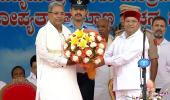
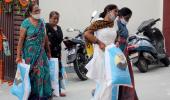




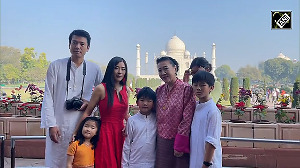
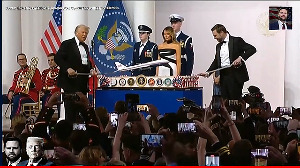
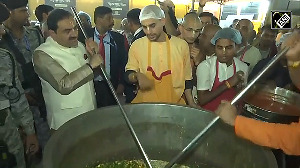
 © 2025
© 2025